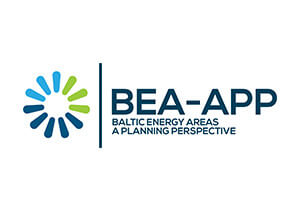
In the project “Baltic Energy Areas – A Planning Perspective” (BEA-APP) 11 partners from eight countries around the Baltic Sea cooperate to support the transition towards low-carbon energy systems.
Background
EU and national policies call for an increase in the share of renewable energy in energy consumption. The Baltic Sea Region is a frontrunner in this respect. Many regions, including the ones of the BEA-APP project, have set very ambitious targets on renewable energy use.
To meet these goals, suitable areas for renewable energy installations such as wind parks, bio-energy units or solar panels need to be available. Spatial planners are tasked with making such space available. At the same time, they need to strike a balance between spatial claims for renewable energy with competing aims and land uses (e.g. nature protection, cultural landscapes, agriculture, tourism).
This job is a challenge in itself. Moreover, spatial planners lack the appropriate spatial planning instruments. Apart from that, they often face local resistance when designating areas for renewable energy production.
Aims
BEA-APP brings together two perspectives: spatial planning as well as regional energy policy. The project aims at increasing the capacity of regional and renewable energy planning actors by:
- Providing adjusted spatial planning instruments targeting renewable energy development,
- Developing innovative stakeholder involvement methods and financing systems to increase social acceptance through local ownership,
- Applying the developed measures to pilot cases, studying the features of suitable renewable energy production sites and, thereby, setting the scene for concrete projects.
BEA-APP is a flagship project under the EU Strategy for the Baltic Sea Region (EUSBSR).
Total cost: 40 000 EUR (LEI part: 17 200 EUR)
Coordinator: Ministry of Energy, Infrastructure and Digitalization Mecklenburg-Vorpommern, Germany
Partners:
- Skane Association of local Authorities, Sweden
- Region Blekinge, Sweden
- Energy Agency for Southwest Sweden, Sweden
- Regional Council of Central Finland, Finland
- Tartu Regional Energy Agency, Estonia
- Zemgale Planning Region, Latvia
- Baltic Environmental Forum – Latvia, Latvia
- Lithuanian Energy Institute, Lithuania
- Regional Office for Spatial Planning of Westpomeranian Voivodeship, Poland
- Roskilde University, Denmark
Project Team
| Name, surname | Office | phone. | |
|---|---|---|---|
|
LEI Representative |
|||
| Nerijus Pedišius | 204/1-LK | +37037401863 | |
|
Project Team |
|||
| Gediminas Zygmantas | 202-LK | +37037401861 | Gediminas.Zygmantas@lei.lt |
| Tomas Vonžodas | 89-BRK | +37037401825 | Tomas.Vonzodas@lei.lt |
| Mantas Valantinavičius | |||
| Arūnas Stankevičius | 203-LK | +37037401862 | Arunas.Stankevicius@lei.lt |
| Agnė Bertašienė | 328/1-AK | +37037401865 | Agne.Bertasiene@lei.lt |
| Paulius Vilkinis | 212-LK | +37037401852 | Paulius.Vilkinis@lei.lt |
| Romualdas Škėma | 114-AK | +37037401802 | Romualdas.Skema@lei.lt |
| Eugenija Farida Dzenajavičienė | 207-LK | +37037401935 | Farida.Dzenajaviciene@lei.lt |
| Stanislovas Vrubliauskas | Stanislovas.Vrubliauskas@lei.lt | ||





